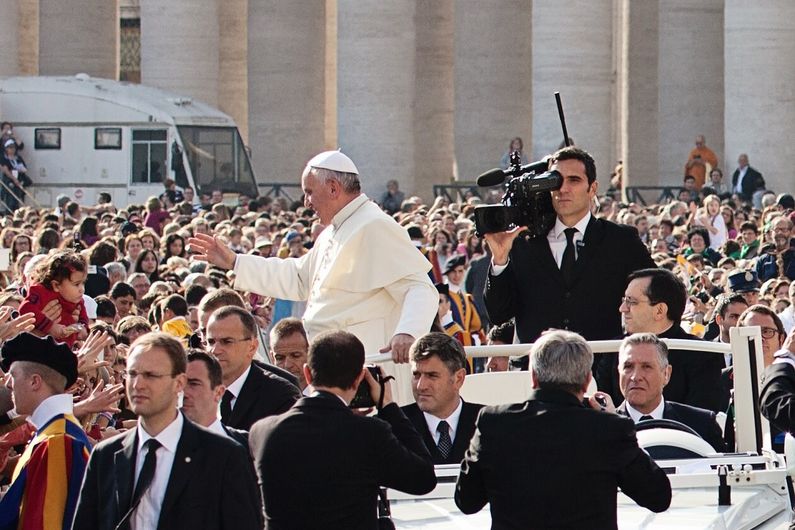Dissecting the Pope’s upcoming visit to Canada
- UdeMNouvelles
07/18/2022
- Béatrice St-Cyr-Leroux
UdeM professor Jean-François Roussel discusses the Pope’s visit within the broader context of reconciliation with Canada’s Indigenous peoples.
In late July, Pope Francis will visit Edmonton, Quebec City and Iqaluit, pursuing the process of reconciliation between the Catholic Church and Indigenous communities that began earlier this year in Rome. The Pontiff is expected to repeat his apology for abuses suffered by Indigenous people at the hands of Church members, most notably in residential schools. And it has been reported that Indigenous culture and spirituality will be front and centre at all the events on the Pope’s schedule.
Does the Pope’s visit at this stage serve a useful purpose? Jean-François Roussel, a professor at Université de Montréal’s Institute of Religious Studies who is interested in reconciliation as part of the larger process of decolonization since the residential schools, provides some background and insight into the issues.
What can we expect in terms of an apology during the Pope’s visit?
Call to Action #58 in the Truth and Reconciliation Commission of Canada’s final report reads as follows: “We call upon the Pope to issue an apology to Survivors, their families, and communities for the Roman Catholic Church’s role in the spiritual, cultural, emotional, physical, and sexual abuse of First Nations, Inuit, and Métis children in Catholic-run residential schools. We call for that apology to be similar to the 2010 apology issued to Irish victims of abuse and to occur within one year of the issuing of this Report and to be delivered by the Pope in Canada.”
The final report was published in 2015, so the call was for an apology in 2016. The report clearly spelled out the purpose of the apology and took Pope Benedict XVI’s apology for the abuse of children by Catholic clergy in Ireland as a model. The Commission criticized the Holy See for not responding in the same way to similar crimes committed against Indigenous children in Canada. But this was far from the first call for an apology from the Catholic Church.
The Truth and Reconciliation Commission also called on the Holy See to repudiate the “Doctrine of Discovery,” which emanated from a series of papal bulls (decrees) issued in the 15th century that granted Spain and Portugal possession of all lands they discovered. Most notable among these was the Inter Caetera of 1493. Many Indigenous groups and scholars argue that these decrees profoundly shaped international law and continue to hinder recognition of Indigenous peoples’ land rights in Canada and elsewhere. Other churches and ecumenical coalitions have repudiated the Doctrine of Discovery, as has the Canadian Conference of Catholic Bishops. However, the Holy See has not, asserting that these papal decrees became invalid centuries ago. And yet no one is talking about this issue in relation to the Pope’s visit. It seems more abstract and theoretical than the residential school experience and its legacy.
Can the Pope’s visit advance the process of reconciliation?
Definitely, because Indigenous people have long been asking for an apology from the Pope, and have long been disappointed and baffled by his failure to give one. The Pope’s recent apology in Rome comforted many Indigenous people.
How is an apology in Canada more meaningful than an apology in Rome?
The Pope is fulfilling another aspect of the call to action: that the apology be delivered by the Pope in Canada. It’s a positive gesture that will be welcomed. That said, Indigenous people are divided on its importance; while some regard it as historic, others see it as a distraction from a process of decolonization that goes far beyond reconciliation.
Some context: survivors and their communities have been calling for an apology from the Catholic Church for many years and some Catholic congregations have in fact apologized, starting with the Oblates in 1991. However, until recently the Canadian Conference of Catholic Bishops had always refused, arguing that residential schools were generally not administered by their dioceses and so were outside their jurisdiction. In the eyes of survivors and their communities, this was a legalistic argument for denying the heavy responsibility of the Catholic Church, which operated 60% of Canada’s residential schools through it many constituent entities. The Conference of Bishops finally issued an official apology last fall, which is another positive gesture.
The Pope’s apology also has another important effect: acknowledging the abuse that occurred in residential schools counters the furtive culture of denial that has persisted in some Catholic circles, which can go as far as blaming survivors for slandering their former benefactors.
Should the Pope’s visit be accompanied by any concrete actions, and if so, what?
Reconciliation must include many concrete actions. However, I’m not sure this can happen in a visit lasting a few days. Meeting the challenge of reparations and restitution for the residential schools is a matter of years, if not generations. But it would be good if, for example, the Pope were to return the Indigenous artifacts currently in the Vatican Museums and if an announcement on this issue were made during his visit.
I also think that reconciliation and decolonization are more the work of Catholic entities at the country level, such as dioceses and religious congregations. For example, the issue of financial compensation, which has been before the courts for years, concerns agreements made between Indigenous peoples and Catholic entities within Canada. The purpose of compensation is to fund healing and reconciliation projects. But what about educating pastoral staff about the history of residential schools and other Indigenous issues? And creating space within the Catholic Church for Indigenous governance, as we see in other Canadian churches?
In short, the Pope’s visit is a positive step that has been a long time coming, one that is meaningful in its own way but certainly not a panacea.
Our experts speak out
Several UdeM professors are available to speak to the media about the Pope's visit to Canada. You'll find them listed here.
Media contact
-
Jeff Heinrich
Université de Montréal
Tel: 514 343-7593














